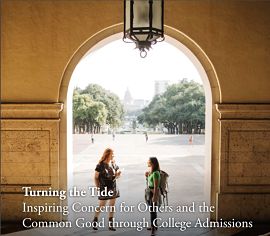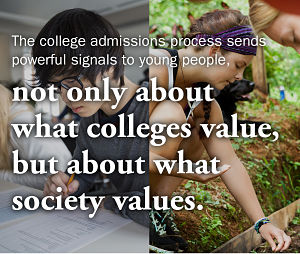“You get what you give.”
This saying, known in some circles as words to live by for finding true purpose in life, will soon have meaning to the college admissions process.
There is growing concern that the current state of college admissions is flawed.
Many college officials are taking notice to a path to college acceptance that relies too heavily on personal accomplishments (grades and test scores). This promotes a selfish, me-first, everyone-against-each-other mentality rather than a care for the common good of others and greater good of society.

A recent report by the Harvard Graduate School of Education reveals a plan to be implemented over the next two years to improve the weight of community service and involvement in the admissions decision.
When the Dean of Admissions at all Ivy League schools get together and agree on something, you better listen.
The college admissions process is a major roadmap for how students choose to shape their high school experience. The future of college admissions will look at what students are doing to make the world a better place.
If you are a current high school student, there are a few things you can start doing that can help you get accepted to the college of your dreams.
Recommended Resources:
Get Involved in your Community
What Goodness Can You Bring to the World?
You must realize we are all in this together. By putting others first, you will be rewarded in the right ways. By opening your heart and your mind, you’re able to see your true calling.
"You've got a reason to live. Can't forget. We only get what we give."
The New Radicals may have been a one-hit wonder from the 90s, but the message they are spreading holds true in many aspects of life. These are lyrics so powerful, they even made the band U2 jealous.
The key thing students need to understand is that in giving, they receive back in more ways than realized: new experiences, new opportunities, perspective, and they grow as individuals. In short: by helping and putting others first, you become a better person.
Find a way to volunteer or perform some type of community service that relates to your passions. Show a willingness to contribute to others in authentic and meaningful ways. Be genuine in your efforts: do something you actually want to do so your heart goes into your work.
Colleges want genuine and authentic people who are dedicated to something of value.

If you have a passion for helping others and growing your community in some manner, colleges will want you. Colleges want difference makers. Colleges want leaders. When individuals involve themselves in these activities, admission offices take notice and are able to look past the surface of test scores and grades and see the true greatness of a student.
If you read between the lines, you’ll notice many colleges across the country already hold this notion of serving others in their mission statements. So, of course colleges would be interested in admitting students who are actively living out their mission statement.
Colleges are looking for sustained, continuous service — work that allows time to make a deeper impact and build and establish relationships with a diverse group of people. What stands out are the people who are doing the service for meaningful reasons and not just showing up so it can be put on an admission application.
“Far too often there is a perception that high-profile, brief forms of service tend to count in admissions.”
Continued effort toward something or a goal shows persistence and perseverance. Doing something on a consistent basis certainly holds more value and will give a greater purpose to the work. Besides, surrounding yourself with a diverse group of individuals from your community outside of your social circle will be more beneficial than you think.
Too often, students put themselves into groups or cliques of people who are all very similar in some way. Doing work of this type gets you out of your comfort zone and deepens your appreciation and understanding of diversity.
Examples of what you can do
Try and build up at least one year of continual meaningful service that engages you in the community.
- Working in groups on community problems
- Volunteering for a cause
- Working on a local park that needs attention
- Fixing environmental degradation
- Working a job to provide needed family income
For added benefit, try and work WITH people of various backgrounds, not for. In a soup kitchen you are working for others. You want to work side by side with a diverse group of people solving a problem or bringing value to the community around you.
Other ways of providing service can be done on a smaller level as well: contributing to one’s family, showing leadership within the household, caring for siblings, and taking on major household duties. If a family doesn’t have the resources to do something and the student steps up to help in some way, this can be seen as an individual who shows initiative and leadership.
Benefits
By immersing yourself in an experience you gain emotional and community awareness in a diverse way that provides perspective and empathy for others. On top of the skills you gain from the experience, you’re able to view the world through other people’s eyes and see the structures and inequalities within society. You experience gratitude and an understanding that our lives are built around the idea to serve others.
Advice for College Applicants
- Quality, not quantity, when it comes to extracurricular activities. Colleges are looking for depth here, so only list what is meaningful and activities you spent a good amount of time in. What is meaningful? You should be able to write a detailed beneficial account of the opportunity and the impact it had on you. One person can only do so much. If you’re listing numerous activities that seem almost impossible to perform at a meaningful level, it really shines through on your application. Admissions staff can gauge authenticity better than you think when it comes to admission applications.
- Don’t pad your resume or overload your schedule with an excess amount of AP/IB courses. You’ll burn yourself out before you even get to college.
- Message to Parents: Don’t overcoach your student. Be comfortable with letting them make decisions. As mentioned before, admission offices can usually tell when an application doesn’t feel genuine.
- Don’t take an admissions test more than twice. Colleges understand some students just aren’t test takers. If you take it once and feel you can do better, take it again, but anything more than twice is unlikely to provide a major improvement in your test score. Like the advice about AP classes above, you don’t want any unnecessary pressure. Don’t wear yourself out. In the future, many colleges may lessen the weight of the SAT/ACT in admissions decisions, perhaps even making these tests optional.
- Be Yourself: There should be no cookie-cutter approach to getting into your favorite college. Be yourself and let your true identity shine through and the right college will find you. People who are different stand out.
- Show a commitment to service. The true value you put in will be rewarded. This can’t just be some half-attempt at volunteering. You need to dedicate time to something meaningful to you and your community. As they say, you get what you give.
“…numerous extracurricular activities or long “brag sheets” do not increase students’ chances of admission.”
“…taking large numbers of AP or IB courses per year is often not as valuable as sustained achievement in a limited number of areas.”
“…Applications that are “overcoached” can jeopardize desired admission outcomes.”
“Authenticity, confidence, and honesty are best reflected in the student’s original voice.”
